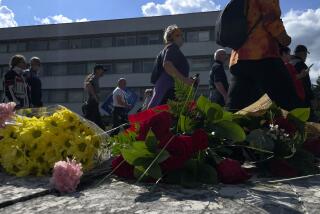Milosevic Arrested at Mansion
- Share via
BELGRADE, Yugoslavia — Former Yugoslav President Slobodan Milosevic surrendered to the country’s new democratic authorities before dawn today and was imprisoned, ending a 40-hour standoff between his bodyguards and police--and an era in Balkan politics.
Milosevic did not resist arrest at his residential compound in the exclusive Dedinje district of Belgrade, the capital of Yugoslavia and Serbia, and police did not use force, the Serbian Interior Ministry said.
However, reporters gathered in the area heard shots fired around the time of the arrest. Serbian Interior Minister Dusan Mihajlovic said the shots were fired by Milosevic’s daughter, Marija Milosevic, 35. There were no reported injuries in the shooting.
While the arrest came on domestic criminal charges, it could eventually set the stage for Milosevic to be handed over to the U.N. war crimes tribunal at The Hague, which has indicted him for crimes against humanity.
Branislav Ivkovic, vice president of Milosevic’s Socialist Party of Serbia, said the former president surrendered voluntarily “to include himself in the legal procedure.” Milosevic considers himself innocent of the corruption and abuse-of-power charges made against him, he added. Ivkovic, who was in the compound during the arrest, urged the Yugoslav people to “give the judges a chance to hand out the final verdict.”
Earlier in the standoff, Mihajlovic quoted Milosevic as having said that “he would not be taken alive to prison.” After the arrest, Mihajlovic said Milosevic’s ultimate decision to surrender peacefully appeared linked to authorities’ efforts to arrest him on domestic charges rather than for The Hague’s allegations.
“I think it was a lot of help, the interpretation that this investigative procedure against Milosevic was not brought under the demand of the Hague Tribunal . . . but it was based on the results of investigation by the police,” Mihajlovic said.
Throughout Saturday, Milosevic’s mainly middle-age and elderly supporters clashed with younger soccer fans and student activists in the Otpor (Resistance) democracy movement.
At times, they fought one another with steel bars, rocks and fists at a police cordon about 300 yards from Milosevic’s home.
A group of soccer fans gathered around a small fire chanting “Tonight is our night! Tonight Slobo is being grilled!”
After midnight, hundreds of young people in high spirits--many of them couples on dates--were still coming by the police lines surrounding the compound to watch the action and celebrate.
Biljana Kajganic, a Serbian Interior Ministry official, said in an interview broadcast on B92 Radio that Milosevic was also being charged for the resistance shown by himself and his supporters during the standoff. “The criminal charges have been definitely expanded against Mr. Milosevic because of these latest events and the consequences of these events,” she said.
An Interior Ministry statement said police had brought Milosevic, 59, into custody on suspicion of violating Article 26 of Yugoslav Criminal Law.
The article refers to violations of the law by groups or through conspiracies, and apparently was being applied to the resistance shown by Milosevic and his supporters. Two policemen were injured in an unsuccessful attempt to arrest Milosevic in a raid before dawn Saturday.
Corruption charges against Milosevic include allegations that he set up a criminal conspiracy to use state customs revenue for his own and his party’s political ends.
Article 26 states that: “Whoever committed criminal acts or used an organization, gang, conspiracy, group or other criminal organization is responsible for all criminal acts which proceed from the criminal plan of such organizations and is punished as if he carried it out himself, regardless of whether he was directly involved.”
Government officials negotiated all day Saturday and into the early hours of today to try to persuade Milosevic to surrender. A few hours before the arrest, about 60 heavily armed special police, some wearing masks, gathered close to one gate of the compound.
The top leaders of Yugoslavia and Serbia, the country’s dominant republic, had been split about how to deal with Milosevic.
But they resolved those differences sufficiently in a three-hour meeting Saturday afternoon to set the stage for the arrest.
Flanked by his top army commanders and all top political leaders, President Vojislav Kostunica--who had been reluctant to approve the arrest--appeared before reporters Saturday afternoon and turned up the pressure on Milosevic by declaring that no one stood above the law.
“In order for a state to survive, no one should be untouchable,” Kostunica told reporters. “Whoever shoots at the police has to be brought to justice. Whoever is called to face an investigative judge has to respond to that subpoena.
“Whoever obstructs the enforcement of the law must bear the consequences, regardless of his rank and office. Whoever starts something should finish it.”
Kostunica read from a brief statement that he said had been approved at crisis talks Saturday by senior Serbian and Yugoslav officials, including Prime Minister Zoran Djindjic and army chief Gen. Nebojsa Pavkovic.
“I think that it is very good that this finale of the October revolution [that ousted Milosevic] happened quietly, democratically and according to all legal standards of democratic countries,” Mihajlovic said after the arrest.
“Agreement within the state leadership made a special contribution to this. He surrendered to the investigating judge and was taken to the Central Prison accompanied by the judge,” the interior minister added.
The original plan was to first take Milosevic to the Palace of Justice for initial legal procedures, but “having in mind the time of day” it was more practical to go directly to the Central Prison, Mihajlovic said.
More to Read
Sign up for Essential California
The most important California stories and recommendations in your inbox every morning.
You may occasionally receive promotional content from the Los Angeles Times.













